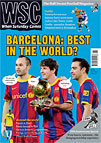 Robert Shaw looks at how Brazilian football still has racial issues to resolve, especially once a footballer’s playing career has ended
Robert Shaw looks at how Brazilian football still has racial issues to resolve, especially once a footballer’s playing career has ended
Botafogo striker Sebastián Abreu put on odd boots – one white, one back – for the club’s derby with Flamengo in the Carioca (Rio state) championship on April 10, while another Rio club, Vasco da Gama, recently launched a shirt with a message on the collar about “democracy and inclusion”.
The boots and the shirts were both reactions to reported racial abuse of Brazilian players in Europe with Roberto Carlos and Marcelo having been targeted in Russia and Spain respectively. Meanwhile, when a banana was thrown at Neymar during Brazil’s friendly with Scotland at the Emirates Stadium on March 27 both player and media were quick to make assumptions about the “racism” of Scottish fans, although the perpetrator turned out to be a German tourist.
For the Brazilian media, race prejudice in domestic football is no longer supposed to be an issue – after all it is over 80 years since Fluminense’s black players daubed white powder on themselves as a way of circumventing the race bar in Rio football. The Brazilian federation blithely supports international anti-racist campaigns that make no specific reference to prejudice in Brazil, while racial abuse among stadium crowds is brushed off, largely as it’s not associated with the far-right, as is often the case in Europe.
Those who deny that such problems exist nowadays point to the prominence of black stars in club and national squads. But the success of players like Ronaldo and Ronaldinho should not mask more systemic problems affecting the advancement of black Brazilians in the country’s football – especially off the pitch. The media has admittedly covered a number of racist incidents recently: notably last season when Atlético PR’s Manoel accused Palmeiras centre-back Danilo of calling him a “monkey”.
Racist incidents have also become tangled up with Brazilian-Argentine rivalry at both club and international level. One notorious case involved the then São Paulo striker Grafite who complained of racist abuse from the Quilmes player Leandro Desábato in a 2005 Copa Libertadores match. The Argentine’s overnight detention in a São Paulo police station threatened a diplomatic incident but the long-term impact was negligible, with Grafite arguably paying the price for rocking the boat. Despite goals galore for Wolfsburg he has had few chances in the national team. Indeed perhaps the only high-profile punishment meted out was to Juventude defender Antônio Carlos Zago, suspended for 60 days for racist gestures and comments to Grêmio’s Jeovânio in 2006.
But while these cases generate interest from the Brazilian media, little is said about the obstacles facing black players who try to become coaches – there are currently none with top-flight clubs. The last one, Andrade, was dismissed by Flamengo last year within months of winning the club’s first national championship for 18 years. Behind the scenes, Flamengo’s white directors talked of him as a stand-in who got lucky. In the fall-out from the club’s title hangover in 2010 Andrade was made the scapegoat for the lack of squad discipline. Black Brazilians have also been conspicuous by their absence from club boardrooms.
Brazil’s failure to win the 1950 World Cup was widely attributed to mistakes made the team’s black goalkeeper Barbosa. Almost all of his successors in the national side have been white, with AC Milan’s Dida being a very rare exception. Barbosa had been described as “a great shaker” a couple of years before the 1950 finals in The Black Man in Brazilian Football by Mário Filho, the first publication that looked at the impact of black players on the early history of the game. The author was the leading sports journalist of his day (the Maracanã later became known as the Estadio Mário Filho) and couldn’t be held personally accountable for the prejudice but it reflected a mood of the time.
A contemporary version of Filho’s book might have to report that black players interested in a coaching or administrative careers have limited opportunities to break down what looks like a peculiarly Brazilian form of apartheid in areas of its domestic game.
From WSC 292 June 2011